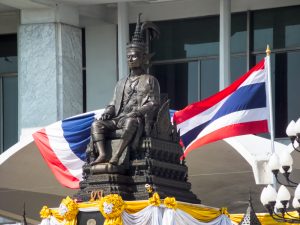On Friday, Thailand’s parliament passed a constitutional amendment introducing major changes to the country’s electoral system that are set to increase the weighting applied to the vote won by the country’s larger parties.
The amendment, passed at a joint session of the House of Representatives and Senate by a vote of 472 to 33, with 187 abstentions, restores the two-ballot election system that existed under the 1997 constitution. Under this system, Thai voters will cast two ballots: one for a local parliamentary candidate and another for the party of their choice.
The rub comes in the number of directly elected seats, and the number elected by so called “party lists.” Prior to this change, 350 of the 500 seats in the House were filled by those directly elected by voters, with the remaining 150 by candidates put forward by parties and won on the basis of how well each party performs in the elections.
Friday’s amendment reduced the number of party-list lawmakers from 150 to 100, which will increase the threshold needed to win those seats, and thus make it harder for smaller parties to win them. The remaining 400 seats will be elected directly.
The law will come into effect after its approval by King Vajiralongkorn, and may also require changes to the relevant election laws.
While the two-ballot system restores an element of the 1997 constitution widely viewed as the most democratic in modern Thai history, the tweak to apportionments is expected to weigh most heavily in favor of Prime Minister Prayut Chan-o-cha’s Palang Pracharath party, which is closely connected to the Thai armed forces.
To be sure, the change, designed with an eye to Thailand’s next election, will also benefit large opposition parties, including the Pheu Thai party, currently the largest party in parliament, which is why most of them supported it. But in itself, the change will do little to alter the basically undemocratic contours of the present constitution, which was drafted by the military junta that seized power in 2014, and which tilts the decks in favor of the country’s royalist-military establishment, which won a vote in 2019.
The most glaring sign of the true purpose of the constitution is the fact that all 250 members of the Senate are appointed by the military, rather than directly elected. The unelected Senate votes jointly with the lower house to elect the prime minister, and helped to get Prayut over the line following the election in 2019.
“It does not matter which election systems we use as long as the senators still have voting power for the prime minister,” tweeted Prajak Kongkirati, a political scientist at Bangkok’s Thammasat University. “The election system is almost meaningless.”
The 2017 constitution was designed to underweight the votes of large political parties, in order to hamstring the political machinery of former Thai Prime Minister Thaksin Shinawatra. Thaksin’s rise had been enabled by the 1997 constitution, which advantaged larger parties, thus allowing the billionaire telecoms mogul to use his personal fortune to build a nationwide political machine.
Before long, this began to unnerve the entrenched power of the military-royalist establishment, which launched coups against Thaksin and his allies in 2006 and 2014. The reason for the weight now being reversed is that the Palang Pracharath party failed to win much of the vote as expected, forcing it to create a jerry-rigged coalition in order to form government.
As such, while some of the specific changes have won the support of opposition parties – one politician from the Move Forward party, the second-largest opposition party in parliament described the new system as “clear and fair” – it supports a broader constitutional architecture designed to entrench the power of the country’s traditional elites.
A root-and-branch reform of this system has been one of the main demands of the youth-led protests that have taken place in Thailand since last year, in addition to reforms of the power of Thai monarchy, which provides its symbolic undergirding.
While the protests have scaled down since last year under the legal offensives from Prayut’s government, they are currently manifesting in near-nightly protests in the Din Daeng district of Bangkok, some involving violent crackdowns by police.
Given its limitations, this constitutional amendment will do little to quell the public protests that have taken place. It will also ensure that the next election, its outcome increasingly foreclosed by the country’s election rules, will do little to resolve the fundamental disagreements in Thai politics.

































